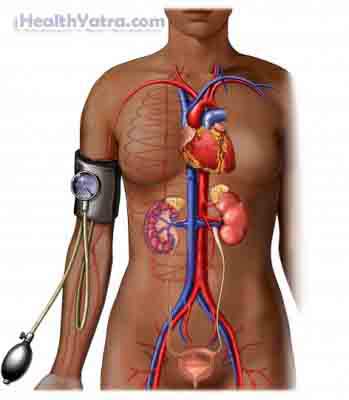Definition
Pre-eclampsia is a problem that occurs in some women during pregnancy. Blood pressure increases and protein appears in the urine. This usually occurs during the second half of pregnancy.

Causes
The cause of pre-eclampsia is unknown. Possible causes may include:
- Genetic factors
- Dietary factors
- Problems with blood vessel function
- Autoimmune disorder—when the immune system destroys healthy body tissue
Risk Factors
Factors that increase your chance of getting pre-eclampsia include:
- First pregnancy
- Family history, such as a mother and sister who also had the condition
- Multiple births
- Inadequate prenatal care
- Pre-eclampsia in a previous pregnancy
- Obesity
- Age: under 18 years old or older than 40 years old
- Race: black
- Chronic high blood pressure
- Kidney disease
- Overweight or obese
Symptoms
Your doctor will look for the following signs:
- High blood pressure
- Swelling that does not go away, especially in the legs and face
- Large amounts of protein in your urine
Women with pre-eclampsia may have symptoms or they may feel fine, especially if the pre-eclampsia is mild. It is important to see your doctor regularly during pregnancy to detect problems early.
Symptoms may include:
- Headaches
- Bloating or water retention
- Noticeably swollen ankles or feet; however, some mild swelling during pregnancy may be normal
- Swelling of the face and upper body when waking up
- Blurred vision or sensitivity to light
- Upper abdominal pain
- Nausea or vomiting
- Seizures or convulsions
Diagnosis
The doctor will ask about your symptoms and medical history. A physical exam will be done.
Tests may include:
Blood Pressure Measurement
A blood pressure reading of 140/90 or higher is considered too high whether or not a woman is pregnant. During pregnancy, blood pressure in the third trimester is compared with blood pressure before pregnancy or during the beginning of the second trimester. Blood pressure is elevated during pregnancy if:
- The first number in your blood pressure reading has risen 30 mmHg or more, or
- The second number has risen 15 mmHg or more
Fluid Retention Assessment
Sometimes, fluid retention is obvious during the physical exam. Fluid retention may cause weight gain of more than five pounds in one week. Sudden weight gain over one or two days is almost certainly due to fluid retention.
Urine Test
Under normal circumstances, there is no or minimal measurable protein in urine. In pre-eclampsia, significant amounts of protein usually appear in the urine.
Blood Tests
Blood tests include checking:
- Complete blood count
- Clotting factors
- Electrolytes
- Kidney and liver function
Treatment
Treating pre-eclampsia early can prevent its progression to eclampsia, which are seizures caused by severe pre-eclampsia. The only way to cure pre-eclampsia is to deliver the baby.
Treatment may include:
Early Delivery of the Baby
If the pregnancy has progressed 36 weeks or more, your doctor may recommend that labor be induced.
Supplements and Medication
Mild pre-eclampsia can often be managed with rest and medicine until 36 weeks gestation. For example, your doctor may recommend that you take:
- Medicines to lower blood pressure
- Magnesium sulfate to reduce the risk of convulsions
- Daily calcium supplement—may reduce the risk of eclampsia, particularly if your calcium intake was low before pregnancy
Home Treatment
If your home situation is stable and you live close to the hospital, your doctor may recommend that you rest at home in a quiet environment. Home treatment may include:
- Taking frequent blood pressure readings
- Getting plenty of rest, mostly in bed
- Obtaining help to prepare meals, do housework, and care for family members
Admission to the Hospital
If pre-eclampsia is moderate or your home situation is not restful, the doctor may admit you to the hospital. Treatment may include:
- Lowering your blood pressure with medication
- Medicines to prevent eclampsia
- Monitoring your baby’s condition
- Making sure you get enough rest
Severe Pre-eclampsia
If the pre-eclampsia is severe, labor may be induced as early as 28 weeks. Early delivery poses a risk to the fetus, but allowing severe pre-eclampsia to continue is extremely risky for the mother and fetus. If possible, the doctor will delay delivery up to 48 hours so that the mother can take medicines to help the baby’s lungs mature.
Most women with pre-eclampsia still deliver healthy babies. A few develop eclampsia, in which seizures, caused by severe pre-eclampsia, occur. Fortunately, pre-eclampsia is usually detected early in women who get regular prenatal care, and most seizures can be prevented.
Prevention
There are no reliable guidelines to prevent this condition. However, the following actions may help prevent pre-eclampsia or other problems related to pregnancy:
- Get early and regular prenatal care. Early treatment of pre-eclampsia may prevent eclampsia.
- If you have chronic high blood pressure, keep it under control during pregnancy.
- Get your doctor’s approval before taking any prescription or over-the-counter medicines.
- Do not smoke or drink alcohol during pregnancy.
- Eat regular, healthful meals and take prenatal vitamins.
- Ask your doctor if you should take a daily calcium supplement. In women who have a low calcium intake, supplementation may reduce the risk of pre-eclampsia, eclampsia, and premature birth.
- Your doctor may recommend that you take aspirin to lower your risk of pre-eclampsia.
